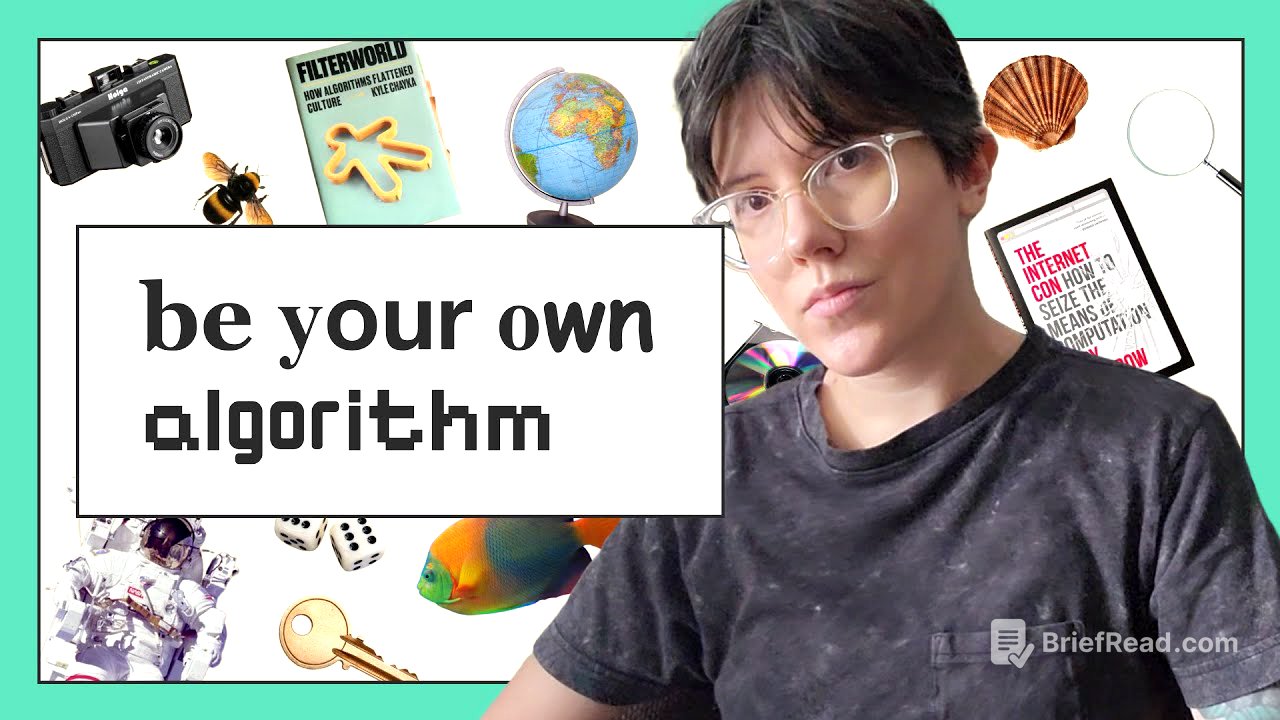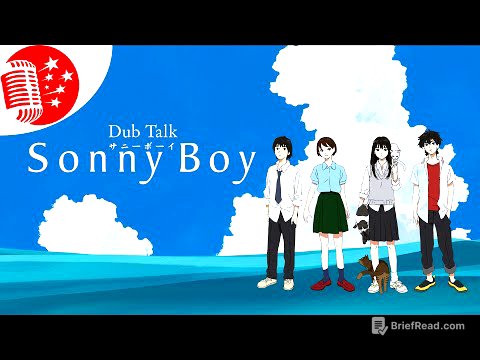TLDR;
This video essay explores the negative impacts of algorithmic social feeds on culture, drawing inspiration from Kyle Chayka's "Filterworld." It argues that while algorithms contribute to cultural flattening and exploit our attention, human creativity remains resilient. The video critiques the tech industry's disregard for users, advocates for reclaiming control over one's digital life, and emphasizes the importance of curiosity and intentional curation in navigating the internet. It also touches on themes of commodification, the illusion of choice, and the need to embrace "cringe" in order to foster genuine self-expression.
- Algorithmic social feeds are harmful and exploitative.
- Human creativity is resilient and can thrive despite algorithmic constraints.
- Reclaiming control over one's digital life requires intentionality and curiosity.
- The fear of "cringe" can stifle creativity and enforce conformity.
- Interoperability and understanding how technology works are key to resisting corporate control.
Intro [0:00]
The author expresses strong disapproval of unregulated algorithmic social feeds, highlighting their potential to suppress independent creators and manipulate users' attention. She criticizes tech companies for prioritizing user engagement over well-being, drawing a parallel to 19th-century American white nationalists' sense of entitlement. The author asserts that tech companies view users as mere sources of data and attention, willing to exploit them for profit. She emphasizes the lack of accountability in algorithmic decision-making and calls for a shift towards human responsibility in shaping online experiences.
Storytime [4:35]
The author recounts an experience where she posted a negative review of Kyle Chayka's "Filterworld" on Threads, and Chayka responded directly to her post. She explains that this interaction is generally frowned upon in the book review community. The author emphasizes that neither she nor Chayka wanted the interaction to occur, but the algorithm facilitated it in pursuit of engagement. This anecdote serves as an example of how algorithms can manipulate users and prioritize engagement over their preferences.
What is Filterworld? [7:10]
The author introduces Kyle Chayka's book "Filterworld," which argues that algorithmic feeds are flattening culture by promoting homogeneity and conformity. She notes the trend of algorithmically served anti-algorithm content and suggests that it appeals to viewers by offering a sense of relief in relinquishing control. The author summarizes Chayka's thesis that culture is becoming less challenging and interesting due to algorithmic feeds prioritizing easily consumable content. She highlights Chayka's critique of Facebook's news feed as a turning point towards reactive content consumption.
Dear Kyle [12:32]
The author addresses Kyle Chayka directly, expressing disagreement with his book's conflation of content substance with its distribution method. She argues that "Filterworld" perpetuates the dangerous aspect of algorithmic culture by divorcing content from its creator. The author defends her work as a creator, emphasizing the effort and risk involved in producing content within the algorithmic ecosystem. She criticizes the lack of compensation and job security for independent creators on platforms like TikTok, comparing them to gig workers with precarious livelihoods.
The medium is the message [15:25]
The author discusses Marshall McLuhan's theory, "the medium is the message," explaining that the medium of communication shapes society more than the content it conveys. She critiques Chayka's application of this theory, arguing that it casts a value judgment on algorithmic social feeds and overlooks the creativity and innovation that artists can achieve within constraints. The author uses the example of movies to illustrate how a medium can have both positive and negative impacts on society. She emphasizes the importance of mass human literacy in the digital age and suggests that the abundance of online content is overwhelming but not necessarily indicative of cultural degradation.
Hipster coffee shop [22:21]
The author examines Chayka's argument that hipster coffee shops are a physical manifestation of algorithm culture, with similar aesthetics and menus driven by Instagram trends. She argues that this phenomenon is not new and is a result of commodification of culture within capitalism. Drawing a parallel to McDonald's, she suggests that the sameness of hipster coffee shops is a business decision driven by consumer demand. The author also discusses the evolution of the term "hipster" and how cultural trends are often co-opted and diluted by mainstream capitalism.
Lo-fi beats to relax/study to [28:13]
The author contrasts Brian Eno's ambient music with the genre of lo-fi hip-hop, challenging Chayka's assertion that lo-fi hip-hop is a forgettable successor to Eno's work. She provides a brief history of hip-hop, emphasizing its origins in black music and its focus on rhythmic beats. The author criticizes Chayka for crediting a white artist (Brian Eno) as the primary influence on lo-fi hip-hop, arguing that it ignores the genre's cultural context and roots in black musical traditions. She suggests that the changing sound of hip-hop reflects evolving social conditions and artistic choices beyond simply appealing to the lowest common denominator.
We'll be right back [32:49]
This chapter is an ad break.
Who curates the curators? [33:57]
The author addresses the idea of lowbrow art being a corrosive cultural force, a central theme in "Filterworld." She critiques Chayka's portrayal of book influencers and his dismissive descriptions of popular romance and fantasy novels. The author emphasizes the importance of context and accurate representation when discussing cultural works. She challenges the notion that creators are solely motivated by financial gain and highlights the value of institutional knowledge and curation. However, she also cautions against blindly trusting cultural institutions, as they can replicate societal injustices.
Flow state [40:57]
The author challenges the use of the word "addiction" to describe smartphone usage, arguing that it is often a mischaracterization of maladaptive habits. She explains that scrolling is often the result of "flow state design," a deliberate strategy to maximize time spent in apps by eliminating friction and encouraging passivity. The author compares scrolling to eating Pringles, highlighting the frictionless loop of consumption that can lead to mindless engagement. She draws a parallel to slot machines, where users become addicted to the trans-like state of the "machine zone" rather than the money itself.
Serendipity [46:49]
The author discusses the concept of "serendipitous design" as an alternative to flow state design, where platforms prioritize curation and discovery. She uses the example of Criterion as a brand that cultivates a loyal audience by focusing on quality over scale. The author cautions against the potential for "artificial serendipity," where algorithms manipulate users into thinking they are making independent choices when they are actually being guided by data and advertising. She references a short story, "The Perfect Match," to illustrate how AI assistants can become overly integrated into our lives, shaping our thoughts and limiting our autonomy.
Am I better than everyone? [52:16]
The author distinguishes between Pringles, a corporate product designed for consumption, and short-form videos, which are often expressions of human experience made with no expectation of compensation. She argues that these videos are art, even if they are sometimes bad or made for financial gain. The author critiques Chayka's tendency to assume that people post online with the primary aim of accumulating clout. She recounts an anecdote about tourists photographing a waterfall in Iceland to illustrate how personal experiences and shared moments can be meaningful regardless of their uniqueness. The author also discusses the work of insta-poet Rupy Kaur, arguing that her work can be a gateway to more sophisticated poetry for some readers.
Interoperability [1:02:53]
The author acknowledges the exploitative systems that artists rely on to distribute their work and highlights the importance of interoperability as a means of resisting corporate control. She explains that computers are universal Turing machines, capable of running any program, and that tech companies benefit from obscuring this fact. The author advocates for the indie web movement and encourages viewers to learn HTML and CSS to create their own personal websites. She acknowledges that creating from scratch can be vulnerable but emphasizes the importance of embracing "cringe" in order to foster genuine self-expression.
Cringe [1:09:41]
The author shares passages from "Filterworld" that she agrees with, emphasizing the importance of thought, attention, and care in cultivating one's own taste. However, she argues that Chayka is primarily interested in culture as a means of acquiring and demonstrating social capital. The author discusses Chayka's relationship to "cringe," noting his dismissive attitude towards his past enjoyment of Dave Matthews Band. She argues that this fear of cringe can be weaponized to enforce homogeneity and that it is essential to embrace one's authentic interests, even if they are perceived as uncool.
I quit scrolling [1:16:00]
The author reveals that she has significantly reduced her own scrolling habits, not as a "cleanse" but as a way to honor her values and design systems that prioritize creating over consuming. She explains that she realized her scrolling was driven by loneliness and a desire for passive connection. The author emphasizes the importance of reclaiming one's attention and becoming curious again, actively seeking out art and experiences rather than passively accepting whatever is presented by algorithms. She concludes by highlighting the power of tools and the importance of using them intentionally to shape the world around us.
Outro [1:23:24]
The author thanks her husband and patrons for their support. She acknowledges the irony of promoting a video about algorithmic feeds through the algorithm itself. The author expresses gratitude to viewers for taking a chance on her content and encourages them to return for future videos.









